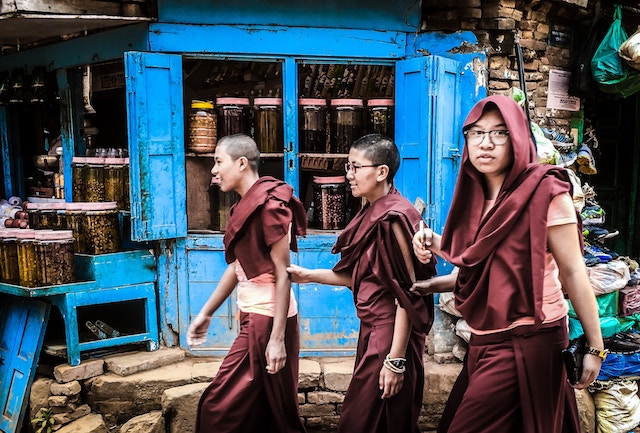I have spent half my life in very poor countries, and I too have been poor for long periods of time.
Fortunately, I was also rich, too, for many years. Now I am somewhere in the middle. But having spent 15 years in poor countries living with very little, I have learned how to be happy regardless of circumstances, and this is largely because of the art of happiness I learned from the most impoverished places I have lived.
Nepal is always ranked within the top 10 poorest countries. The per capita income is about $300. I lived there for 13 years. I lived about five years in India, including a six-month stint on the streets of Calcutta. Poverty generates resourcefulness, and there is a good deal of satisfaction in being resourceful.
Poverty also generates generosity, and it is rare to see a stingy poor person. Having suffered many trials, the poor are patient, tolerant, and accepting of others. You seldom see an arrogant poor person or a conceited one. Necessity demands the poor look after each other—and care for one another.
If you walk about the poorest areas of Kathmandu, Nepal, or New Delhi, India, you will find them buzzing with life—but not so in the richer areas. Being self-sufficient and a person of means can come at the cost of becoming disconnected from our basic human values, while poverty fosters them. When you literally can’t survive on your own, you naturally value others, but when we don’t need others, we tend to isolate ourselves, even in the company of others. Poor people don’t have a shell around them; pretense is too easily seen through in poor communities.
No doubt one of the greatest strengths of the poor is their ability to share without counting the cost. When a new family wanders into an impoverished shanti town, some family will offer them food and shelter or help them to settle. They will give half their own plate of food to someone who asks. The reason there is so much joy in the ghetto is because they don’t hoard, but openly give what they can. If they only have three potatoes for dinner, they will offer one to you, maybe two! (My actual experience.)
People accustomed to waiting hours to get even a bucket of water learn patience well. They are tolerant and quietly put up with occasional rude behavior. People from all sectors of society and locations join poor communities. There is no room for biases or prejudice in the vastly diverse communities of the poor; it’s about all surviving, not killing each other. Impoverished villages are caring for others; they are not shy to ask when in need or provide when asked.
In the United States and Europe, the highest suicide rate is among the well-to-do, while the lowest rate is from the poor community. If our society is to survive, there should be an exchange of resources wherein the well off uplift the poor materially and take to heart and learn the lessons poverty has imposed on the poor to bring out their basic humaneness.
The lessons of the poor are not restricted to the poor. If we are to learn these lessons and are currently living a comfortable lifestyle, we—unlike the poor, whose circumstances impose upon them so many valuable lessons of life—must take the initiative ourselves. I became a millionaire after half a life of poverty, because I inherited a bunch of money. But, fortunately a combination of Buddhist training and lessons from living with the poor allowed me to realize that I can still live frugally and humbly as a wealthy person.
One of the most valuable restraints a person of means can place on herself is not only not living beyond her means, or even within them, but living below them. While the challenge may be an imaginary one, it works. But, it does require discipline. There is something wonderful about living within a familiar context, drinking from the same cup every morning, using a set of plates you purchased upon the birth of your children who are now past 30, using a bike your kids left in the garage when they went to college, keeping in touch with old friends, and never losing the warmhearted feeling toward anyone.
Despite having the wherewithal to isolate ourselves in an ivory castle, we should never allow ourselves to do so. Instead, like the poor, we should be vulnerable, open, and available to others who may need our assistance. Our means should never be a source of pride or arrogance. Our means should be viewed as something to share with others or to create, to express kindness and generosity when we are asked, or see an opportunity to do so,
By putting restraints on ourselves, we create the conditions to be truly happy. This, of course is no secret, but something that virtually all religious traditions advise. When we come to regard our good fortune as public property and our free time likewise, we do more to create happiness and joy than we could upgrading our house or buying a new car. We are individuals, and there is a natural limit on how much a single person can enjoy, but there are many other people out there, and if we bring a little light into their eyes, we increase our own capacity to be happy exponentially.
A good exercise is to imagine our lives without the resources we have and seeing how having less would affect our character. Habituating ourselves to this kind of reflection will instill in us a more humble and humane attitude, and we will naturally feel more warmth toward others. It will help us to see the value in simplicity and the hollowness of seeking gratification in acquisitions.
Just because we can afford it, doesn’t mean we need it. Like the poor, we should give when asked, and not count the cost. If we do this, we will always have something to give. The real treasures in our lives are the people that populate it, and we will be far happier if we can deepen our friendships and make them genuine and heartfelt.
The poor offer a wealth of lessons for those of us who are well off and comfortable, and those of us who are not can benefit equally. The great yogi, Paramahansa Yogananda observed, “While the East could benefit from the wealth of Western countries, Western countries could benefit from the spirituality of the East.” Poor countries have every bit as much to offer us as we do them. If we pay attention and mine out what is of true value, it will be a source happiness.
Experiencing the richness of life is not the domain of the rich or the poor, but the poor don’t have wealth, which often instills arrogance and conceit which isolates us from each other and obstructs the emergence of our better qualities. Jesus Christ alluded to this when he said, “It is harder for a rich man to enter the kingdom of heaven, than a camel to pass through the eye of a needle.” While we don’t have to abandon our wealth, we should be aware of its dangers (which often appear as its benefits) and act accordingly to avoid its pitfalls.
Taking a cue from the ways of the poor—humility, humbleness, generosity, tolerance, patience, caring, sympathy, kindness, and such qualities of character poverty often engenders—we will enjoy what we have been blessed to have more by realizing that the poor have something more valuable than wealth to offer.
~
~
~
Author: Richard Josephson
Image: Unsplash/Rosanna Fung
Editor: Travis May
Copy Editor: Yoli Ramazzina

 Share on bsky
Share on bsky





Read 0 comments and reply